 Petzlover
Petzlover Galgo Espanol is originated from Spain but Kuvasz is originated from Hungary. Galgo Espanol may grow 9 cm / 3 inches shorter than Kuvasz. Galgo Espanol may weigh 23 kg / 50 pounds lesser than Kuvasz. Galgo Espanol may live 3 years more than Kuvasz. Both Galgo Espanol and Kuvasz has same litter size. Galgo Espanol requires Low Maintenance. But Kuvasz requires Moderate Maintenance
Galgo Espanol is originated from Spain but Kuvasz is originated from Hungary. Galgo Espanol may grow 9 cm / 3 inches shorter than Kuvasz. Galgo Espanol may weigh 23 kg / 50 pounds lesser than Kuvasz. Galgo Espanol may live 3 years more than Kuvasz. Both Galgo Espanol and Kuvasz has same litter size. Galgo Espanol requires Low Maintenance. But Kuvasz requires Moderate Maintenance
 Galgo Espanol means Spanish with galgo meaning greyhound, thus a Spanish Greyhound. This breed is ancient with their roots in perhaps the English greyhound and others in the sighthound family. They are much like the greyhound in that they are laid back, calm, gentle and quiet, unless they are competing on the local track. Like the greyhound they are shy and reserved; great with kids and other pets. And of course, they love cats.
Galgo Espanol means Spanish with galgo meaning greyhound, thus a Spanish Greyhound. This breed is ancient with their roots in perhaps the English greyhound and others in the sighthound family. They are much like the greyhound in that they are laid back, calm, gentle and quiet, unless they are competing on the local track. Like the greyhound they are shy and reserved; great with kids and other pets. And of course, they love cats.
There are dogs like the Galgo referred to in writing by the ancient Celts and Romans. One author, Arrian, had his own Galgos and used them when hunting. The breed flourished in the second half of the Middle Ages in Spain and well into the 8th century. When the Christians regained control of the Iberian Peninsula, they did away with the hunter old forms of hunting and introduced a new form with hounds that made the Galgo the pride of the aristocracy and not in the homes of the ordinary people. Arrian claim to two types of dogs, the smooth and rough coated.
Muslim and Chrisitan Kings kept Galgo Espanols. In all probability the Saluke and Galgo were crossbred at this time. It was illegal to kill a Galgo and in 1081, the Mayor of Cartuario of Slonza left his Galgo in his will to Diego Citid. Dogs seen in painting from the 12th century look just like dogs of this breed who can be seen today.
It is believed that when the Galgo was developed, it was in the midsection of Spain or the Castillian plains. They ruled the interior of the country while the bloodhound ruled the exterior. The 18th and 19th centuries saw very little change in the breed. However, in the 20th century, there was cross breeding with the English greyhound that produced a leaner, faster and powerful track racing dog. The results was a faster dog without the long distance stamina of the pure Galgo. For this reason, the breeders returned to breeding the pure professional racing dog.
The sport of racing the Galgo earns Spain around sixty million dollars per year. They train anywhere from three to four thousand of the Galgos every year for Open Field Coursing Championships. Still, there no longer is any cross breeding between the Greyhound and the Galgo. The current coursing programs feature a hare that is much hardier and difficult to pursue so the stamina of the old Galgo Espanol is desired. In Castile, where these games are played, the landscape is open with large fields that requires that the hare travels far greater distances. This means that the stamina of the original Galgo Espanol is needed.
When not racing the Galgos have become great house pets. They have a reputation as gentle dogs that are docile and quiet, with good health. This reputation is well earned. They are also successful show dogs in Europe much more than the states. This is perhaps because they are really rare outside of Spain. They are not recognized by the United Kennel Club nor the American Kennel Club.
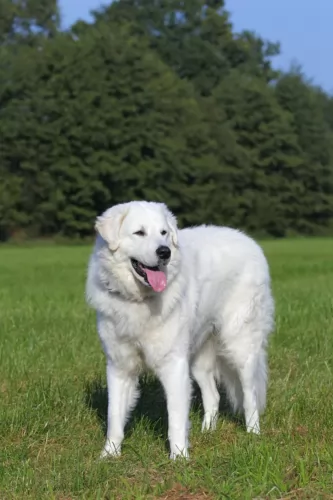 The Kuvasz is an ancient dog breed from Hungary. It is believed that the dog is the oldest of the ancient Hungarian dog breeds, and in fact a fossilized skeleton dating back to the 9th century, and almost identical to the modern Kuvasz, was found near Keszthely.
The Kuvasz is an ancient dog breed from Hungary. It is believed that the dog is the oldest of the ancient Hungarian dog breeds, and in fact a fossilized skeleton dating back to the 9th century, and almost identical to the modern Kuvasz, was found near Keszthely.
During the 15th century the Kuvasz became very sought after, being found in royal courts. Puppies were given as royal gifts. Later the popularity of the breed waned and then it was found in its traditional role of guarding livestock.
As Kuvasz numbers dwindled, breeding efforts were started but it is believed that other large dogs such as the Great Pyrenees were used with the Kuvasz to continue with the breeding programs.
In 1884, the first Hungarian standard for the breed was written. It was in 1966 that the Kuvasz Club of America was established.
 Obviously the Galgos looks a lot like the Greyhound, but in some very important ways they are very different. The rear of the Galgos is higher than the front and their muscle are flatter. They are built for endurance while the Greyhound is built for speed. The Galgos is a lighter, smaller dog with larger ear on a long head. They have long tails and their chests are not deep like the Greyhounds.
Obviously the Galgos looks a lot like the Greyhound, but in some very important ways they are very different. The rear of the Galgos is higher than the front and their muscle are flatter. They are built for endurance while the Greyhound is built for speed. The Galgos is a lighter, smaller dog with larger ear on a long head. They have long tails and their chests are not deep like the Greyhounds.
The Galgo comes in smooth and rough coats and a variety of colors. The rough coat protects dogs that are in climates colder than the ones in Spain and also keeps them from injuring their skin while running. The colors include brindle, black, golden, toasted, cinnamon, yellow, red, white, white with patches, or any color as long as they have a white forehead and muzzle.
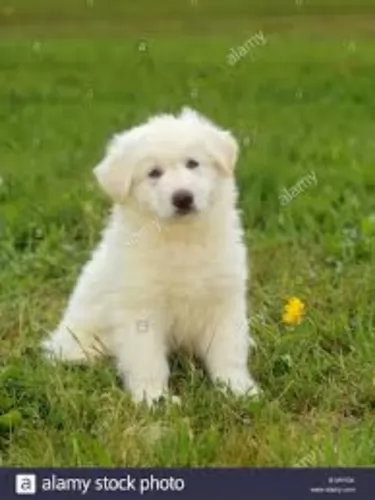 The beautiful Kuvasz is a large, muscled dog standing at 65 – 76cm in height and weighing 35 – 52kg. He has a double coat of dense white hair which can be straight or wavy.
The beautiful Kuvasz is a large, muscled dog standing at 65 – 76cm in height and weighing 35 – 52kg. He has a double coat of dense white hair which can be straight or wavy.
It is natural for the dog to lose most of the long coat during the Summer months. In other words this dog has a seasonal coat.
The nose is black, the eyes brown and alert, the ears are of medium length and floppy and the tail is carried long and low.
The Kuvasz is an intelligent dog who will benefit from training and socialization. It is always wise to have large dogs like this trained because just his size can cause problems if he isn’t obedient.
He is also described as a clownish type of dog which means he’ll entertain and amuse you. Certainly he is playful as a puppy but he calms down quite a bit as he grows into maturity. He is independent, and those who have owned such a dog report that he can be loving and loyal with his human family, wanting to guard and protect them. Others will say that he tended to be aloof, even with his human family.
Used as working dogs, the Kuvasz has learned to be independent and they will need a firm, strong owner who is also fair with them, otherwise they just do their own thing. They’re active dogs and because of their size they won’t suit city living where there is a tiny garden.
 They are good with children, but you need to be careful no one gets knocked down or hurt.
They are good with children, but you need to be careful no one gets knocked down or hurt.
Stamina for running and a good record in lure coursing.
Though they can be couch potatoes like greyhounds they are better off with a fenced yard and not an apartment.
They are smart and can learn anything you want to teach them if you can keep their attention.
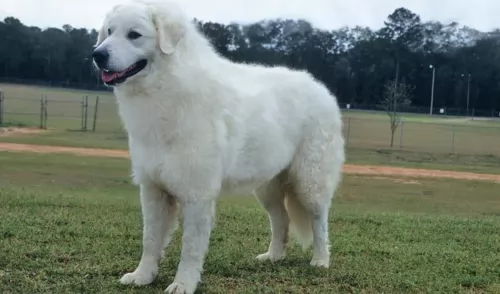 Kuvasz are guarding dogs, they’re intelligent and loyal, making them excellent family dogs with the right training and socialization.
Kuvasz are guarding dogs, they’re intelligent and loyal, making them excellent family dogs with the right training and socialization.
They’re able to get on well with other pets in the home as well as children. He is a beautiful dog and another bonus is that he isn’t particularly high maintenance.
As is common with many other large-breed dogs, he will have a shorter lifespan than what you’d get with a smaller dog breed, but if you feed him high quality food, exercise him and involve him in your activities, this large dog can become a wonderful friend and protector for you.
 Being a large dog, the Galgo Espanol would normally face a high probability of hip dysplasia. Fortunately for the breed this is not true. In this respect their lightness of weight, their history as a working dog and their anatomy have protected them from it. They are however susceptible to other issues.
Being a large dog, the Galgo Espanol would normally face a high probability of hip dysplasia. Fortunately for the breed this is not true. In this respect their lightness of weight, their history as a working dog and their anatomy have protected them from it. They are however susceptible to other issues.
Malignant tumors that quickly spread throughout the body. Life threatening.
As a sighthound, the Galgo Espanol is prone to have issues anytime with anesthetics. They don’t metabolize the anesthetics like other dogs do. They will take longer to revive, and they are susceptible to hypothermia while under an aesthetic.
While running, they are prone to injuries
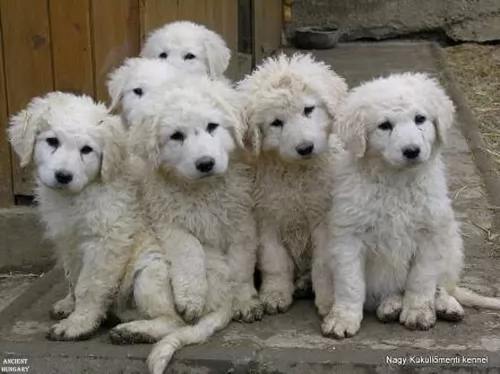 The large Kuvasz is a healthy dog breed that with good care can reach 12–14 years of age. Being the large dog that he is, he may well be prone to bone and joint problems. It is why good nutrition is so important for this dog - feeding him the best food with vitamins and minerals.
The large Kuvasz is a healthy dog breed that with good care can reach 12–14 years of age. Being the large dog that he is, he may well be prone to bone and joint problems. It is why good nutrition is so important for this dog - feeding him the best food with vitamins and minerals.
You know the saying ...you are what you eat... and this applies to dogs too. Good food can help to ward off serious illnesses. Big dogs like this often have to contend with hip dysplasia which can be both painful and debilitating as well as eye diseases.
This is where the eyelid of the dog rolls inwards, causing irritation and pain for the dog. There is also Ectropion, where the eyelid rolls outwards.If you see your pet has a red eye which is watery and which has pus, visit your vet. Entropion surgery will correct and repair and condition.
 Feed your puppy a high quality dry food made for large breed dogs. Feed 3 meals a day 2.5 to 3 cups total for the day.
Feed your puppy a high quality dry food made for large breed dogs. Feed 3 meals a day 2.5 to 3 cups total for the day.
Feed your adult Galgo a high quality dry food made for large breed dogs. Feed 2 meals a day but don’t overfeed Give 4-5 cups total for the day.
They have amazing stamina and good speed. Generally good health as a breed.
He can be a couch potato indoors and runs forever outdoors. He does need daily exercise and bedrest both. The best would be if you could sprint him every day or have a small yard he can play in. They excel of course at agility and lure coursing. Keep them on a leash because if they run you will never catch them. The American Sighthound Field Association presents lure coursing events that they are eligible for. They have exceled at show competition in Europe but are not well known in the U.S.
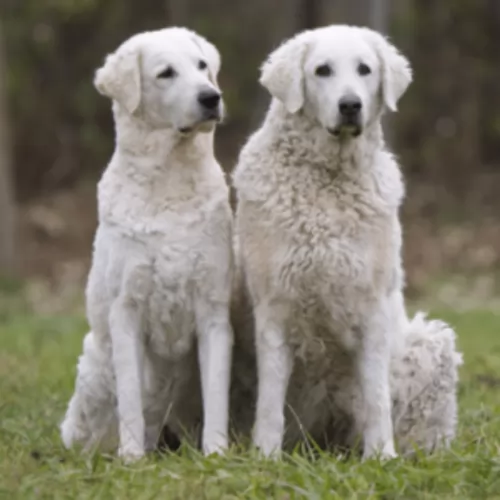 The coat may be fairly long and thick but it doesn’t require any special kind of grooming. A good brush twice a week will be adequate and will help with getting rid of stubborn knots and matting.
The coat may be fairly long and thick but it doesn’t require any special kind of grooming. A good brush twice a week will be adequate and will help with getting rid of stubborn knots and matting.
He is a seasonal shedder and this frequent brushing will make sure the coat remains groomed and shiny.
The Kuvasz is a hardy breed who just loves the outdoors. He is a dog that doesn’t do well in the heat. Make absolutely sure that he has a cool, sheltered spot where he can lie down. Ensure that there is always a bowl of fresh, cool water available to him.
There is quite a bit of conflict and controversy regarding nutrition in dogs. The idea is to keep it simple. If you buy a commercially manufactured dog food, check the ingredients on the packaging.
You want to be sure your pet is getting vitamins and minerals in instead of preservatives, fillers and colorants. Try and give him some home made food too such as some chicken, brown rice or pasta and some vegetables. You can mix this into his dry kibble occasionally with a little bit of raw meat too when you have.
Avoid feeding your dog things such as chocolates, nuts, onions, sweets and chips.